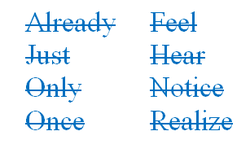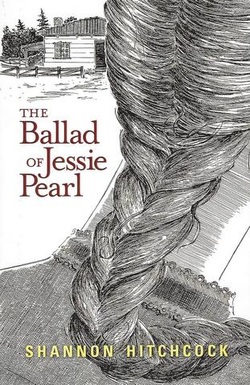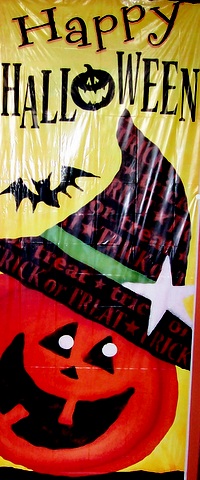 Last week, I finished the second full revision of my manuscript. Last weekend, I started word searches for problem words and finished that search around 2:30 this fine Friday afternoon. My eyes are bleary from staring at words like know, hear and feel, pesky filters that slip into our work and dilute the action. Then there are the prepositions, so necessary to sentence construction but oh my how they do pile up on a page: as and when are two of my worst offenders. As I scrolled through the work, I added pet words to my list, like stiff, step, focus and maybe. Reining in the word first, I discovered my character has many first times. Is it possible she's that naïve? Or am I a little too fond of that phrase? And her heart is cited so often, I worried about the health of that organ. At some point I realized (also a filter), I was replacing troublesome words with other troublesome words, as with when, feel with seem . . . you get the picture. So I squared my shoulders, took aim at the culprits and hit the delete key, erasing whole sentences if I must to eradicate the problem. By the time I finished, over a thousand words had been erased. I sat back, shell-shocked from a week of word war. I hope next week when I sit down in this chair to begin the third revision, I won't see a hole-riddled manuscript with passages that don't make sense. But seriously, I think this was a valuable exercise and worth every writer doing at least once. You'll come away knowing what words and phrases you overuse. It challenges you to not lean on familiar crutches, to find new ways of expressing the thoughts in your head. The bolded words in this post are all on my list. What repetitive words are on yours?
0 Comments
 "Jessie has a choice to make Wondering 'bout which road to take Jessie has a choice to make Will Jessie Pearl be a lonely girl?" So reads a stanza from the ballad gifted to fourteen-year-old Jessie by her sister. Shannon Hitchcock's debut novel, The Ballad of Jessie Pearl, set in 1922, rural North Carolina presents a feisty, young heroine facing adult challenges. Jessie Pearl dreams of going to teacher's college, a dream she shared with her late mother. Jessie's sisters are all married and settled. They tease that Jessie will be wed by seventeen to her beau, J.T. But Jessie holds tight to her dream. Then her sister dies from tuberculosis after giving birth to a son. Jessie quits school to care for her nephew, cook and clean for her family. As the year passes, her affection for J.T. grows and Jessie wonders, even if she finds a way to finish her basic education, could she leave her family and J.T. for teacher's college? The ballad her sister wrote is unfinished and Jessie isn't sure how it will end. Despite the odds, will she achieve her dream? It's worth reading the book to find out. Shannon Hitchcock's southern roots shine in this book. If she appears in your area, don't miss her reading this gem with her fabulous Carolina drawl.  For the next few months, maybe longer, I'll be posting once a month and I celebrate the freedom to do this because . . . I don't have a book to promote! That's right. There are some positives to not having a book deal. At a local SCBWI event, writing coach, Joyce Sweeney, encouraged us nonpubs to embrace this time. Published authors in the room shared knowing glances and smirked. They remember their prebook days with fondness: no agent and publisher prodding you to do backflips and handstands to sell your book; no full calender of signings and school visits; no mad scramble to lure readers on blog, Facebook and Twitter. Joyce offered many sage morsels that day. I sat in a back corner, womanning the sign-in table, and though Joyce couldn't see me, twice her words struck like a bullet. First, she talked of focusing on your sweet spot as a writer. She said often new childrens' writers explore every avenue from picture book to young adult and that's helpful if you use it to find your strengths. Then, it's time to concentrate. If it's PBs, start cranking out stories like a factory. If it's middle grade or YA, write short stories and work your way up to novels. I've been writing for four and a half years and I've juggled PBs, MG and YA for almost the entire journey. I've always felt that my voice is better suited to MG and YA but the artist inside urged me to try PBs. I've been blessed to belong to the best PB group (in my biased opinion) in Florida, Rob Sanders' PB&J, Picture Books and Java. They are my writing family. Perhaps my attachment clouded my reasoning because from the beginning, I've heard: "Your voice is too old for PBs" (my words not there's. They were always much kinder.) So, Joyce's advice hit the target. I needed to quit struggling with PBs and focus on my novels for older children. A small part of me rejoiced, the sensible writer who fought the artist for my attention. A large part of me silently wailed at my inevitable resignation from PB&J. As I recovered from that shock, Joyce addressed branding and how not focusing on one genre can affect new writers. She cited a writer who had a pending deal on a MG novel. The interested agent (or editor, I can't remember which) Googled the writer and up pops a website featuring the author's self-illustrated PBs. The agent wasn't interested in representing PBs so she turned the novel down. Joyce continued, saying agents and publishers want to see an author committed to building devoted readership by producing consistent books. OUCH! I slunk down in my chair, feeling as if a path had cleared from Joyce to my seat and all eyes targeted me. My website is all over the place. I tried to focus it on writing but . . . well, look at it; there's a giant, clothed rabbit hosting the home page! And even though there's only one portfolio page, the art is what viewers notice. No one ever comments on the writing. So, guess who will be revamping their website? One day, I hope to have agents and publishers Googling my name and when they do, I want to be ready. Until then, I'm enjoying my freedom. Today, I don't have to worry about branding or book promoting. The Bible says there's a time for every season. Rejoice fellow nonpubs! This is our season of learning to write the best book we can. Since, I'm only posting once a month, I'm throwing everything I've got here. If you're in Florida, Tennessee or Missouri, please watch for events promoting Rob Sanders' debut PB, Cowboy Christmas. The launch party is Saturday, Nov. 3 at Inkwood Books in Tampa and you don't want to miss it. Rob's hired cowboy strummers and there's sure to be tasty refreshments. Happy Halloween everyone. Wishing you treats, no naughty tricks! In April I attended a workshop led by author and writing coach extraordinaire, Joyce Sweeney. The workshop focused on character but Joyce also critiqued first pages. Since many attend summer conferences where first pages are often reviewed, I thought I'd share what I learned from Joyce about that all-important start to a book.
This is my fifth year dedicated to learning to write and beginnings still feel like my nemesis. I revisit them repeatedly, experience "aha" moments when I think I've found the perfect opening only to see it dashed in critique. How do you accomplish all that's required in two-hundred and fifty words? Readers need to meet the protaganist and it isn't a casual introduction. They want to know their personality, age, their goal and conflict, where they live and when. They might also meet secondary characters. They'll need to know their relationship to the main character and what distinquishes them. For that reason, I try to keep the characters on the first page to a minimum. You don't want readers scratching their heads over who's who. On top of all that, the opening reveals the event that changes everything for the MC, the moment that sets the story in motion. That moment might be your HOOK! (yes, it is spoken in capitals. With an exclamation mark). Writers learn early about the need to snatch readers and reel them in. Huge units of brain power are burned trying to create irresistible openings. You have one, maybe two paragraphs to convince readers to buy your book. So, you promise thrills or chills or mind-shifting worlds. Which brings me to the first new tidbit I gleamed from Joyce's feedback: Genre should be evident from the start. If you're writing a ghost story, introduce spooky; if it's dystopia, show us the altered world; if contemporary, place us in the now. This is something I've ignored. I focused on character, conflict and setting, expecting readers to discover genre on the next pages. It's seems obvious now . . . if I'm expecting sci-fi and I find none on the first page, why would I read the book? The second discovery I made at the workshop was about character introduction. Readers need to relate to the main character, even want to be the character. So Joyce advised against showing their big flaw on the first page. The example she read opened with a protagonist who vomited when she was nervous . . . and she did it on the first page. It was a well-written scene but would you turn that page? You want the reader to like/admire/feel-compelled-to-follow the character before you introduce flaws that make them gag on the chocolate they're munching. First page reviews at conferences and workshops offer authors professional feedback. Eventually, your book will be submitted to agents and publishers and the industry is too overworked to read past a manuscript's unimpressive start. In my opinion, even people who choose non-traditional publishing benefit from first page critiques. We all want the same thing . . . to write books readers enjoy. So, I'll keep learning what I can about these vexing beginnings. Do they trouble you too? What advice has helped you improve them? I recently tried to explain voice to a non-writer. I mangled the subject badly, prompting this post . . . an attempt to clarify my understanding of the term.
Publishing pros call for books with strong voice, a voice readers can relate to. For me, that voice is the narrator in my head that begins each story (for simplicity, let's assume the main character is always the narrator). The MC whispers a scene. One scene leads to another and as the story develops, so does the character. Their voice grows stronger, more distinct. By the end of the book, I know their history, their quirks, their secret dreams and greatest fears. I know how they talk and move. Most importantly, I know how they view and react to the world. The challenge for writers is to translate the MC's point of view into words. From the opening sentence on the first page, the narrator is on stage. Joan Bauer's Hope Was Here starts: Somehow, I knew my time had come when Bambi Barnes tore her order into little pieces, hurled it in the air like confetti, and got fired from the Rainbow Diner in Pensacola right in the middle of lunchtime rush hour. That sentence defines the narrator as a keen observer and gutsy optimist who's looking for opportunities. I also sense she has a sense of humor from her colorful description of the ticket-shredding incident. Hope's personality, her voice, comes across loud and clear and I know from the opening, I'll love seeing this story through her eyes. Protagonist's voices rise from a writer's experiences and you could say, each are versions of the writer's personality. But in order to fully realize the MC, writer's must be willing to face their own fears, prejudices, and fantasies; to explore unknown territory. The narrator should be free to have habits we dislike and think things we wouldn't. Their voice should speak the story without interference. Writers can't be cowards. Last year, a contemporary book I was working on stalled when I faced scenes I wasn't ready to write. Skimming through them with a watery version of the MC's point of view would have been a waste of time. I've restarted the book and I'm gathering courage. If I can't be true to the voice, I won't have a story worth telling. In children's books, voice must be age appropriate. Many picture book writers capture the youngest readers with lovable characters who do laughable things. Middle grade readers are still dependent on their parents but they expect protagonists who solve their own problems without adult assistance. Middle grade voice is my favorite . . . straddling vulnerabilty, awkwardness, and the edge of maturity. Older teens are strongly influenced by hormones and the need to forge their own path. Most MC's in young adult books deal with love on some level and independence. The young adult voice runs the gamut from sweet to dark and gritty. Unlike those who write for adults, children's writers must tailor their story through a voice authentic to the intended reader. One last thing about voice. Once the book is published, readers bring their voice to the page and how they experience the story is out of your control. At an SCBWI conference, author and creative motivational speaker Lisa McCourt shared her poem about the reader's voice. In it she says : . . . It is your voice saying, for example, the word barn that the writer wrote but the barn you say is the barn you know or knew. Students are counting minutes until the last school day and daydreaming about summer adventures. Some kids will find those adventures in books. So for the next few months, I'll review books that lead the mind on fantastic journeys. And for non-readers, I'm only covering books available in audio form. Listen to them on that long car ride to Aunt Ethel's (or some relative who lives hours away and pinches your cheek). I promise you won't be sorry.
My first pick is packed so full of wondrous tales, I'm surprised it doesn't spontaneously combust! The Chronicles of Harris Burdick is introduced by Lemony Snicket who begins, "Is There any author more mysterious than Harris Burdick"? Who can resist reading on? Lemony says Harris appeared over twenty-five years ago in a a publisher's office with a stack of titled drawings. The publisher was intriqued and Harris promised to return the next day with the stories behind the art. That was the last anyone saw of him. The Mysteries of Harris Burdick by author/illustrator Chris Van Allsburg (of Polar Express and Jumanji fame) was published in 1984. To this day, Harris Burdick's drawings continue to inspire writers, animators and songwriters, all featured on Van Allsburg's website. Last year, the drawings hatched The Chronicles of Harris Burdick, a collection of fourteen stories by illustrious writers, including some of my favorites: Kate DiCamillo, Lois Lowry, Gregory Maguire, and M.T. Anderson. The irresistable tales flex the mind with titles like ""Uninvited Guests"" by Jules Feiffer, ""The House on Maple Street"" by Stephen King and "'Just Desert"" by M.T. Anderson. My personal favorite so far (I'm savoring them!) is ""The Harp"" by Linda Sue Park. Imagine an old magician who isn't quite ready to retire, two bickering sisters banished outdoors by annoyed parents, and a boy, mourning his mother and facing a miserable summer with an "off the grid" grandfather. The stories tickle the mind, raising questions that will linger long after the last word is read. We found Burdick's chronicles in the middle grade section of the library but the writing is sophisticated enough to entertain older teens and adults. You'll want to check the book out even if you prefer the audio version. The unseen drawings will trouble your sleep if you don't! This is a micro post week. I'm chin deep in dummy book art for a collaborative picture book that hopes to travel to an editor's desk by May 1st. The images are seared into my eyeballs and they chase me to bed. They feel raw, rough, like a scruffy street orphan. I'm a fine artist with no digital skills so everything's freehand. I have no subjects to model for the dummy and I'm not used to pulling figures from my imagination, much less scenes. My art always relied on concrete references, photos or real life.
There's no turning back now. I made a committment and I'm pouring myself into this project. It's consumed most of my creative energy for the last few weeks. My other stories lay neglected. The dust in my house grows daily. And the condition is likely to worsen. This weekend I'm participating in a day long workshop with author Joyce Sweeney. I'm very excited to learn from her. I'm also hoping to attend SCBWI's summer conference, God willing. That requires other stories be sharpened and another dummy book drawn. Aiyiiii . . . no time, gotta run! |
AuthorI write middle grade and young adult books with a magical twist, and I'm represented by the fabulous Leslie Zampetti at Open Book Literary. Writer Websites
Augusta Scattergood Maggie Stiefvater Rob Sanders Fred Koehler JC Kato Sarah Aronson Kelly Barnhill Linda Urban Kate DiCamillo Jacqueline Woodson Helpful Links SCBWI Agent Query Lorin Oberweger - Freelance Editor Search BlogArchives
May 2020
Categories
All
|
 RSS Feed
RSS Feed
